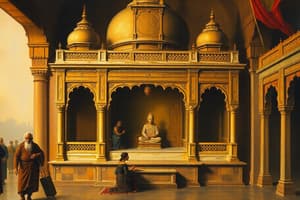Podcast
Questions and Answers
What was the primary strategy employed by Murshid Quli Khan to reduce Mughal influence in Bengal?
What was the primary strategy employed by Murshid Quli Khan to reduce Mughal influence in Bengal?
- He transferred all Mughal jagirdars to Orissa
- He conducted a major reassessment of Bengal's revenues
- He seized control of the revenue administration
- All of the above (correct)
How did the state's revenue system allow new social groups to gain influence?
How did the state's revenue system allow new social groups to gain influence?
- The state sold the right to collect taxes to the highest bidders
- Local bankers and moneylenders guaranteed tax payments to the state
- Revenue farmers had considerable freedom in tax assessment and collection
- All of the above (correct)
What was the primary impact of Murshid Quli Khan's strict revenue collection on zamindars in Bengal?
What was the primary impact of Murshid Quli Khan's strict revenue collection on zamindars in Bengal?
- Zamindars lost control over revenue administration in their areas
- Many zamindars had to borrow money from bankers and moneylenders
- Unable to pay, some zamindars were forced to sell their lands
- Both A and B (correct)
Which of the following statements about the Mughal state's revenue system is NOT true?
Which of the following statements about the Mughal state's revenue system is NOT true?
What strategy did the Mughal state employ to collect revenue?
What strategy did the Mughal state employ to collect revenue?
Which of the following regions did the Mughal Empire gradually lose control over during the period described in the text?
Which of the following regions did the Mughal Empire gradually lose control over during the period described in the text?
Which of the following statements accurately describes the states carved out of the old Mughal provinces in the 18th century?
Which of the following statements accurately describes the states carved out of the old Mughal provinces in the 18th century?
What was the common factor among the founders of Awadh, Bengal, and Hyderabad states?
What was the common factor among the founders of Awadh, Bengal, and Hyderabad states?
Based on the information provided, which of the following statements is true regarding the zat ranks of the founders of Awadh, Bengal, and Hyderabad?
Based on the information provided, which of the following statements is true regarding the zat ranks of the founders of Awadh, Bengal, and Hyderabad?
What can be inferred about the relationship between the founders of Awadh, Bengal, and Hyderabad and the Mughal Empire?
What can be inferred about the relationship between the founders of Awadh, Bengal, and Hyderabad and the Mughal Empire?
Which of the following groups of states is NOT mentioned in the passage as being part of the three overlapping groups in the 18th century?
Which of the following groups of states is NOT mentioned in the passage as being part of the three overlapping groups in the 18th century?
Based on the information provided, which of the following statements is true regarding the relationship between the Mughal Empire and the independent states in the 18th century?
Based on the information provided, which of the following statements is true regarding the relationship between the Mughal Empire and the independent states in the 18th century?
Which of the following was a common feature among the regional states that emerged in the 18th century?
Which of the following was a common feature among the regional states that emerged in the 18th century?
What was the relationship between the regional states and wealthy bankers and merchants?
What was the relationship between the regional states and wealthy bankers and merchants?
Which of the following statements about the regional state in Bengal under Alivardi Khan is true?
Which of the following statements about the regional state in Bengal under Alivardi Khan is true?
What can be inferred about the military campaigns of the regional states from the given information?
What can be inferred about the military campaigns of the regional states from the given information?
Which of the following statements about trade routes in the 18th century is supported by the given information?
Which of the following statements about trade routes in the 18th century is supported by the given information?
Based on the information provided, which of the following statements is true about the separate states that emerged in the 18th century?
Based on the information provided, which of the following statements is true about the separate states that emerged in the 18th century?
Flashcards are hidden until you start studying




